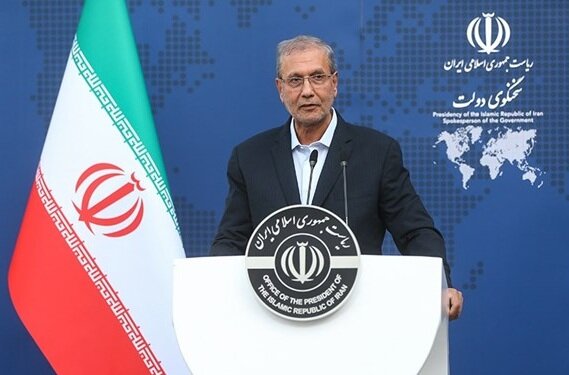Iran did not collapse after heavy sanctions, says government

TEHRAN — Speaking at his last press briefing as government spokesman on Monday, Ali Rabiei said goodbye to reporters and discussed the latest developments in the country.
He began the briefing by saying that the goals of the planners of the economic war did not succeed and “Iran remained Iran”.
“This, naturally, put a heavy strain on people's lives. Inflation and the devaluation of the national currency were the result of unprecedented and horrific sanctions,” Rabiei said.
The government spokesman said many predicted a worse situation and the collapse of Iran, but not only Iran's economy did not collapse, but also grew in 2020. However, he said, the lives of the people were greatly affected by the sanctions and this was a serious concern for the government.
“For these reasons, the government’s supportive policies were pursued, including the equalization of salaries of the retired, the provision of support packages to stakeholders, and increase in salaries of workers,” he explained.
The spokesman added sanctions and lack of access to resources coupled with excessive dependence on foreign revenues made the job difficult for the people and the government, he pointed out.
The people are still suffering from sanctions, he lamented.
Rabiei said, “Today, at the end of the government, I want to say that the sanctions upset the price balance of many goods in the market.”
He added, “The path we took was not wrong; we still say that moderation is the only way to succeed and overcome obstacles.”
Elsewhere in his remarks, the spokesman said that he prays for the success of the next government.
“The future government has a difficult path ahead. We should all have reasonable expectations of the future government. The next government is also under sanctions.
Sanctions are an undeniable fact. The future government will face the three challenges of the outgoing government today. Climate change and drought are real and serious. Undoubtedly, we cannot continue with the normal habits,” he stated.
Rabiei called climate change and coronavirus as "man-made extremism of nature" and challenges that the future government will face.
The psychological effects of Coronavirus and sanctions will always remain in the minds of the people, the spokesman remarked.
In addition, our experience over the past eight years suggests that the only effective way to meet these challenges is through tolerance, rationality, and hard work to overcome them,” the spokesman added.
He advised everyone to accept that the future government is the government of all the people in Iran.
“Let's admit that the elections are over, but the foreign evils are still there, and we need a strong presence against those evils,” the spokesman added.
Raisi will be formally confirmed as president on Tuesday by Leader of the Islamic Revolution Ayatollah Ali Khamenei. During the endorsement ceremony, Raisi will receive the presidential mandate from Ayatollah Khamenei.
The ceremony will be attended by a number of high-ranking and mid-ranking officials as well as foreign dignitaries.
Interior Minister Abdolreza Rahmani Fazli will first present a report on the June presidential election in which Raisi won by a landslide. Raisi and the Leader will also deliver speeches respectively.
Two days later, Raeisi will be sworn in as president in the Majlis (parliament).
Foreign Ministry spokesman Saeed Khatibzadeh announced on Sunday that dozens of delegations at the level of president, prime minister, parliament speaker, foreign minister or special envoy will visit Tehran to take part in the swearing-in ceremony on Thursday.
Khatibzadeh said the attendance of foreign officials at the ceremony demonstrates Iran’s high status and legitimacy in the world.
SA/PA
Leave a Comment